- Last Updated: January 15th, 2026
Key Takeaways
Accountability measures for social media are critical in promoting ethical use.
Legislative and voluntary actions are developing to enhance transparency.
Balancing free speech with harm prevention remains a primary challenge.
Overview of Social Media Platform Accountability
On this page, we’ll discuss an overview of social media platform accountability, responsible social media practices, legislative efforts that aim to ensure social media platform accountability, and much more.
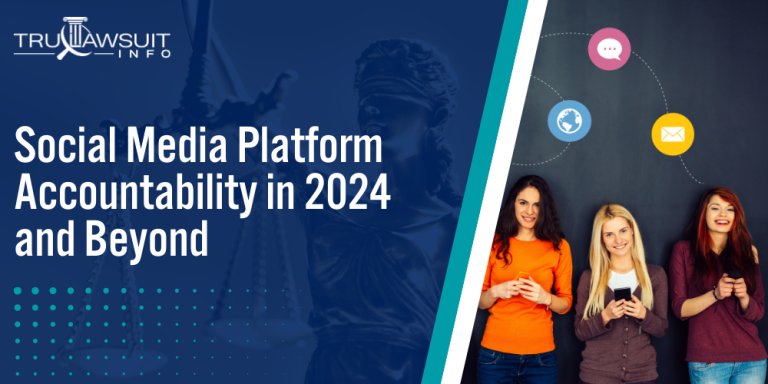
Intro to Social Media Platform Accountability
Below are some key areas where accountability is being addressed and how it is expected to change in the future:
- Government Regulations: Increasing governmental oversight and regulations aim to hold social media platforms accountable for content moderation, data privacy, and user safety.
- Corporate Responsibility: Social media companies are under pressure to implement stricter policies to prevent harmful content, protect user data, and combat online harassment.
- User Empowerment: New tools and features are being introduced to give users more control over their online experience and reporting mechanisms to address inappropriate behavior.
- Industry Standards: Collaborative efforts within the tech industry are leading to the development of shared standards for content moderation and user safety.
If you’re concerned about the impact of social media platforms and their accountability, understanding these trends can help you pursue compensation.
Contact Tru Lawsuit Info using the chat on this page for a free case evaluation regarding social media platform accountability.
The Evolution of Social Media Platform Accountability
The journey of social media platform accountability has been marked by significant changes in how these platforms are regulated and held responsible for the content they host.
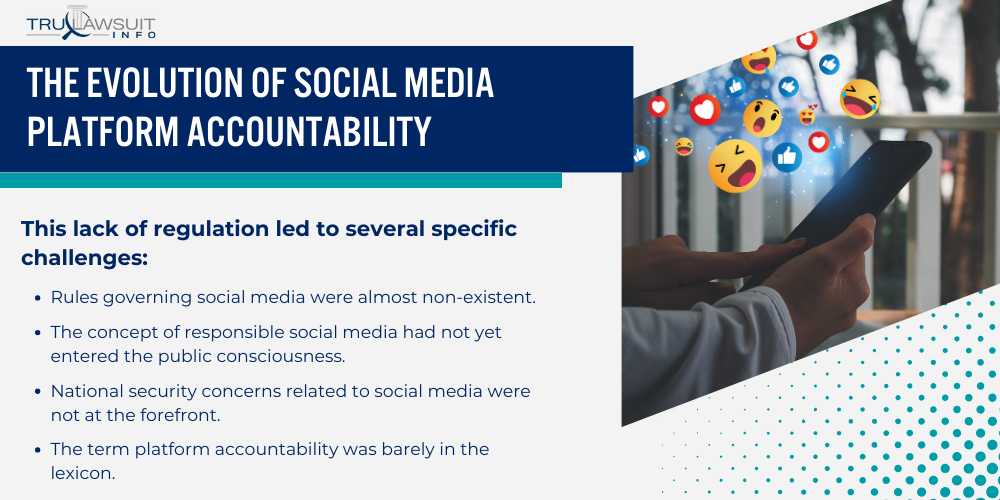
Early Days of Social Media and Lack of Regulation
Today, social media companies operate with minimal oversight, which often leads to a laissez-faire environment online.
These platforms quickly became central to many aspects of daily life, yet they largely avoided the regulatory scrutiny that traditional media faced.
This lack of regulation led to several specific challenges:
- Rules governing social media were almost non-existent.
- The concept of responsible social media had not yet entered the public consciousness.
- National security concerns related to social media were not at the forefront.
- The term platform accountability was barely in the lexicon.
Growing Concerns Over Privacy and Misinformation
As social media grew, so did the awareness of its impact on privacy and the risks of misinformation.
Public and legislative pressure began to mount, calling for greater responsibility and changes in how social media platforms shape public discourse.
This heightened scrutiny led to several notable developments:
- The Online Harms endemic to unregulated platforms became more apparent.
- Legislation like the Transparency Act was proposed to enforce accountability.
- Platforms began to acknowledge their role in policing hate speech.
- Social media reform became a topic of national and international conversation.
The evolution of social media platform accountability demonstrates a shift from a largely unregulated online space to one that recognizes the need for oversight and responsible management of digital communities.
Key Issues Driving Social Media Platform Accountability
Addressing social media platforms’ accountability involves several critical issues, notably the propagation of false information, inherent biases in algorithms, and the imperative to safeguard user data.

The Spread of Fake News and Disinformation Campaigns
Social media has dramatically transformed the landscape of public debate, blurring the lines between responsible social media use and the unrestrained dissemination of misleading content.
Platforms have been criticized for:
- Allowing false narratives to proliferate unchecked, influencing both local and global discourse.
- Social media platforms shape the information that billions of people across the globe consume.
- Failing to sufficiently challenge the spread of fake news, thereby eroding the credibility enjoyed by traditional media.
- The creation of echo chambers exacerbates societal polarization and hinders public debate.
Algorithmic Bias and Discrimination in Content Moderation
Content moderation systems have come under fire for potential biases that can discriminate against certain groups.
Driving platform accountability means addressing:
- How algorithms may inadvertently marginalize content from specific populations, leading to a lack of representation.
- The “black box” nature of content curation mechanisms can obscure the decision-making process of users and watchdog organizations.
- The essential role of transparency is in understanding why certain content is amplified over others.
- The challenge for social media companies is to balance moderation with freedom of expression while maintaining community standards.
Protecting User Data Privacy and Security
User data privacy and security are paramount, and there are increasing demands for social media companies to be transparent and accountable for data usage.
Protective measures include:
- Implementing robust data protection protocols to defend against unauthorized access and new threats.
- Providing clear and concise user agreements that delineate how and why data is collected and used.
- Fostering trust through accountability measures that ensure compliance with privacy regulations.
- Engaging with a working group such as one affiliated with the National Science Foundation to improve data privacy standards.
Legislative Efforts to Regulate Social Media Platforms
Recent legislative initiatives aim to enforce platform accountability and establish community standards on a global scale, targeting social media platforms to ensure responsible social media practices.
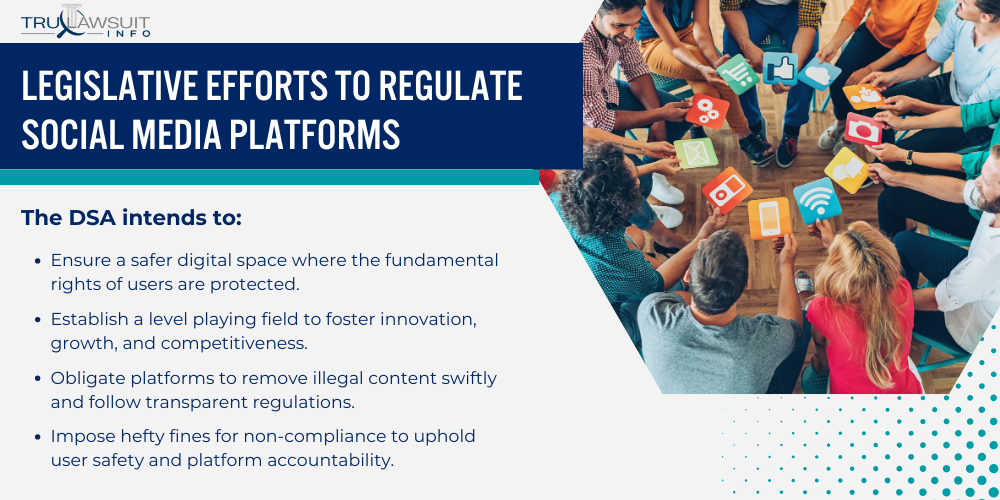
The EU’s Digital Services Act
The European Union has taken significant steps with the Digital Services Act (DSA) to regulate social media companies.
The DSA intends to:
- Ensure a safer digital space where the fundamental rights of users are protected.
- Establish a level playing field to foster innovation, growth, and competitiveness.
- Obligate platforms to remove illegal content swiftly and follow transparent regulations.
- Impose hefty fines for non-compliance to uphold user safety and platform accountability.
It will be necessary to verify the compliance of platforms with the rules decided by democratic institutions.
Proposed Reforms in the US: Section 230 Modifications
In the United States, discussions around amending Section 230 of the Communications Decency Act have been intensifying.
Proposed changes to Section 230 aim to:
- Hold social media platforms accountable for illegal content on their services.
- Encourage social media companies to apply community standards more effectively and uniformly.
- Allow affected persons the means to seek legal recourse against platforms.
- Bill Cassidy, among other lawmakers, supports modifications to address concerns over content moderation and platform responsibility.
- The Platform Accountability and Transparency Act is designed to increase transparency around social media platforms.
Voluntary Measures Taken by Social Media Companies
Social media companies, recognizing the public’s need for transparency and accountability, have implemented a variety of voluntary measures to address these concerns.
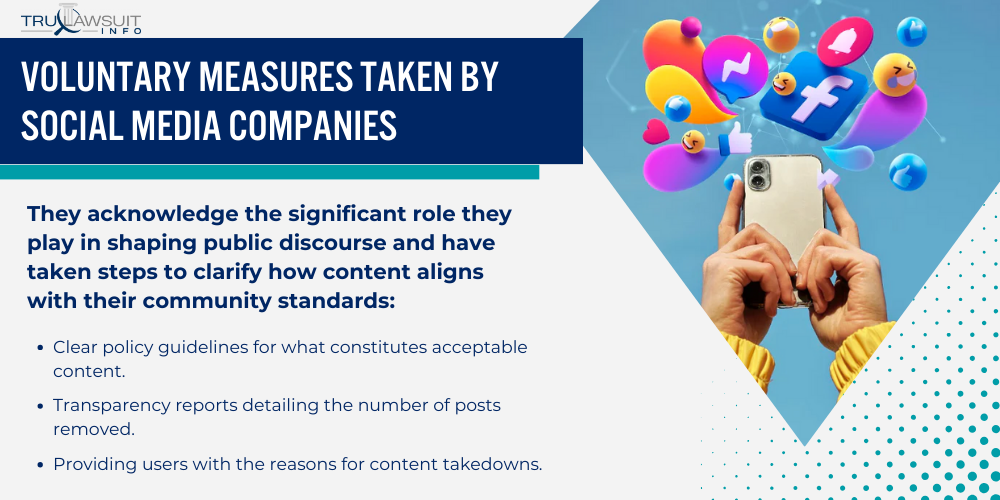
Transparency in Content Moderation Policies and Decisions
Social media platforms have started to provide users with more detailed information on their content moderation policies.
They acknowledge the significant role they play in shaping public discourse and have taken steps to clarify how content aligns with their community standards:
- Clear policy guidelines for what constitutes acceptable content.
- Transparency reports detailing the number of posts removed.
- Providing users with the reasons for content takedowns.
- Introducing appeal processes for users to challenge decisions.
Investment in Fact-Checking and Combating Misinformation
Platforms are increasing efforts to combat misinformation by investing in internal systems and external partnerships:
Social media companies have ramped up their efforts to verify the accuracy of information shared:
- Partnering with independent fact-checkers.
- Developing AI algorithms to detect potential misinformation.
- Notifying users about information accuracy with warning labels.
- Demoting proven false content to reduce its spread.
Partnerships with Third-Party Auditors and Researchers
In a bid to enhance transparency and foster trust, social media companies are increasingly collaborating with independent auditors and research organizations.
These partnerships are designed to rigorously evaluate and report on the integrity of the platforms’ practices and policies.
To improve accountability, social media firms are opening their doors to scrutiny:
- Allowing third-party researchers to examine platform data.
- Facilitating studies to understand the effects on users and society.
- Engaging with civil society groups to assess platform impacts.
- Publishing results from external audits to acknowledge findings and insights.
The Role of User Empowerment in Platform Accountability
Empowerment of users plays a pivotal role in enhancing the accountability of social media platforms.
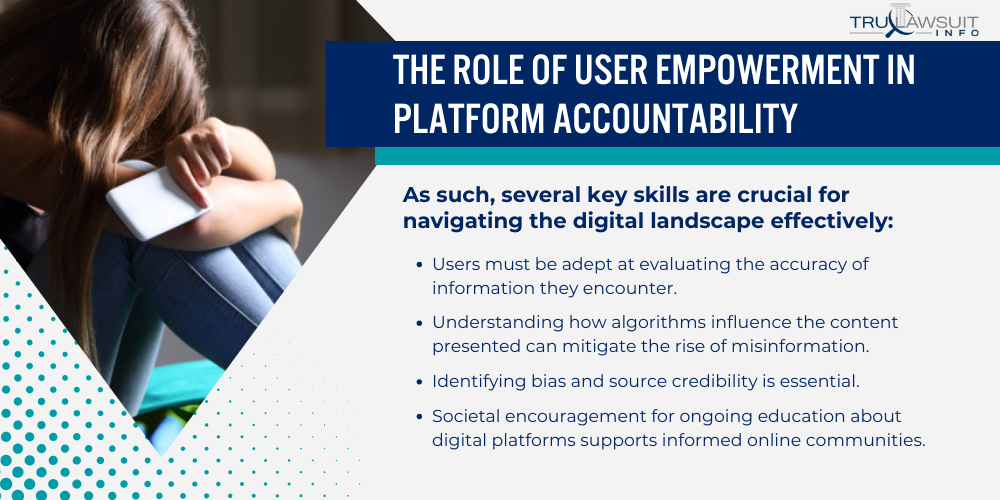
By arming themselves with knowledge and tools, individuals can effectively contribute to a more transparent and responsible digital ecosystem, fostering better outcomes for democracy, society, and mental health.
Importance of Digital Literacy and Critical Thinking Skills
Digital literacy and critical thinking are the foundation of user empowerment.
They enable users to discern credible information and recognize manipulative content.
As such, several key skills are crucial for navigating the digital landscape effectively:
- Users must be adept at evaluating the accuracy of information they encounter.
- Understanding how algorithms influence the content presented can mitigate the rise of misinformation.
- Identifying bias and source credibility is essential.
- Societal encouragement for ongoing education about digital platforms supports informed online communities.
Tools for Reporting Abusive Content and Misinformation
Platforms provide tools enabling users to report abuses, becoming stakeholders in platform accountability.
To maximize the effectiveness of these tools, users should take several steps:
- Users should familiarize themselves with platform policies on reporting content that violates community standards.
- Effective use of reporting systems contributes to removing harmful content and misinformation.
- Support from social platforms in the form of accessible reporting tools is critical.
- Continuous feedback loops between users and platforms help improve these tools.
User-Driven Initiatives to Hold Platforms Accountable
User-driven initiatives are instrumental in asserting community influence over platform governance.
These initiatives manifest in several impactful ways:
- Transparency campaigns led by users demand clearer information from platforms on how data is used and content is moderated.
- Collaborative efforts, like crowd-sourced fact-checking, bolster defenses against misinformation.
- Users can advocate for external audits of platforms to ensure adherence to proclaimed standards.
- Collective actions, such as boycotts or pushes for regulatory changes, serve as powerful mechanisms for societal impact.
Balancing Free Speech and Platform Responsibility
In the era of digital communication, the tension between free speech and the responsibility of social media platforms is increasingly evident.
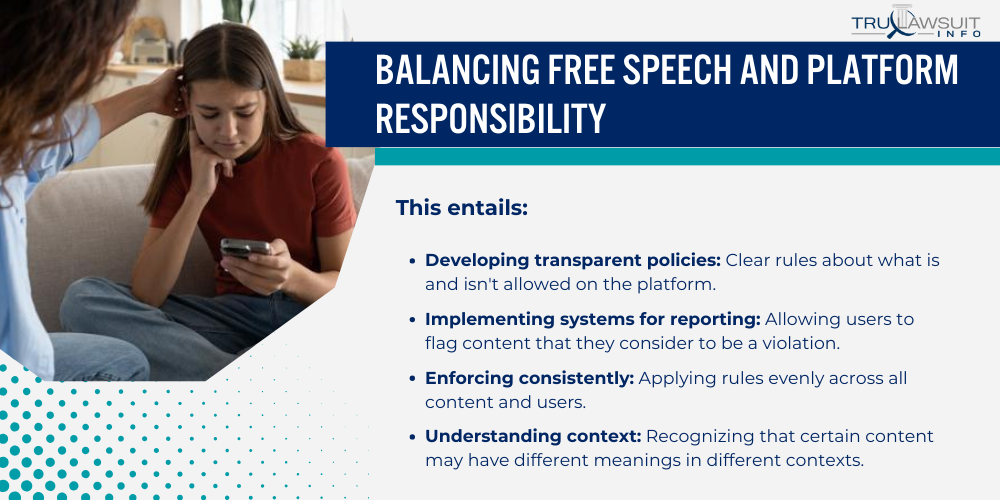
Platforms must tread carefully to uphold user rights while preventing harmful speech.
Content Moderation and Censorship
Social media platforms must create and enforce community standards that respect free speech while limiting harmful content.
This entails:
- Developing transparent policies: Clear rules about what is and isn’t allowed on the platform.
- Implementing systems for reporting: Allowing users to flag content that they consider to be a violation.
- Enforcing consistently: Applying rules evenly across all content and users.
- Understanding context: Recognizing that certain content may have different meanings in different contexts.
For example, regulating content that promotes hate speech while ensuring legitimate expressions of political dissent are preserved has led to significant challenges.
Collaborating with Governments and Civil Society Organizations
Platforms often engage with external stakeholders to inform their moderation practices.
They must consider:
- Adhering to Local Laws: While respecting free speech, they must comply with the jurisdictions they operate in.
- Cooperating With Authorities: Especially when content crosses the line into illegality, such as incitement to violence.
- Consulting Experts: Collaborating with experts to balance human rights with speech regulation.
- Informing Users: Educating their community on both the rules and rationale behind content removals.
Legislation such as Section 230 in the United States affects how moderation is applied and holds platforms accountable to differing standards of liability for user-generated content.
The Future of Social Media Platform Accountability
Emerging Technologies and Their Impact on Accountability
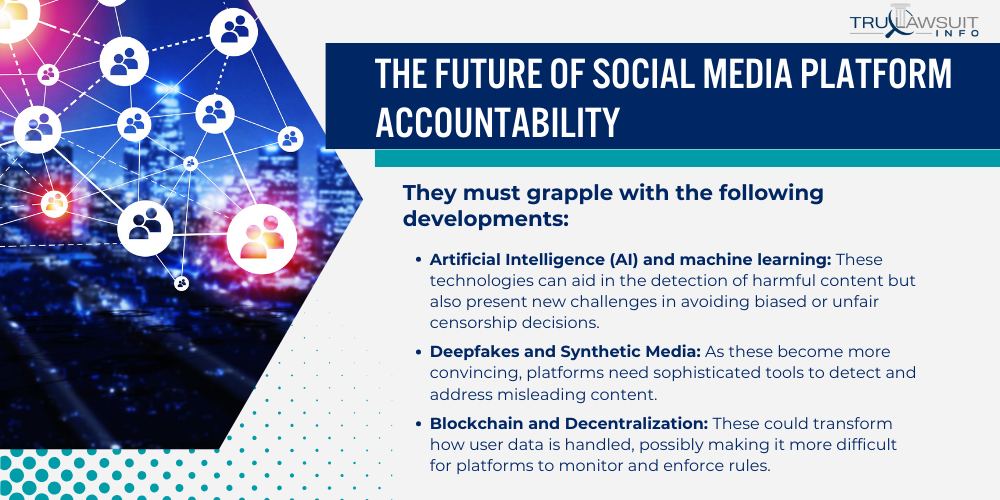
Technological advancements are rapidly changing the way users interact with social media platforms.
They must grapple with the following developments:
- Artificial Intelligence (AI) and machine learning: These technologies can aid in the detection of harmful content but also present new challenges in avoiding biased or unfair censorship decisions.
- Deepfakes and Synthetic Media: As these become more convincing, platforms need sophisticated tools to detect and address misleading content.
- Blockchain and Decentralization: These could transform how user data is handled, possibly making it more difficult for platforms to monitor and enforce rules.
- Users expect platforms to be competent in handling the responsibility that comes with these technologies to maintain their trust.
Regulations for Evolving Platforms and User Behaviors
As digital platforms grow and user interactions become more complex, regulations must adapt to ensure they effectively address new challenges and opportunities.
Governments and regulatory bodies are thus focusing on creating rules that keep pace with technological advancements and shifting user behaviors.
The legal frameworks surrounding social media must evolve:
- Transparency in data sharing: Legislative efforts like Senator Coons’s Platform Accountability and Transparency Act seek to shed light on how platforms operate and impact society.
- Privacy Protection: Users demand robust protection of their personal information against misuse.
- Data Portability: This empowers users to move their data freely across platforms.
- Content Moderation: Clear, consistent, and fair policies are essential for both users and regulators to understand.
Culture of Responsibility and Ethics in Social Media Companies
To foster a more ethical and responsible environment, social media companies must integrate core ethical principles into their business models and daily operations.
This approach is critical in shaping a culture where decision-making prioritizes the well-being of users and the broader community.
The internal culture of these companies must prioritize ethical considerations:
- A commitment to ethical standards is key for maintaining user trust and avoiding misuse of platforms.
- Employee awareness and training on the ethical implications of their work are important.
- User-centric design philosophies should emphasize respect for user rights and well-being.
- Partnerships with independent researchers and policymakers can help in the continuous assessment and improvement of social media platforms.
Case Studies of Successful Platform Accountability Initiatives
In the evolving social media landscape, certain accountability initiatives stand out for their success in enhancing user experience and establishing industry best practices.
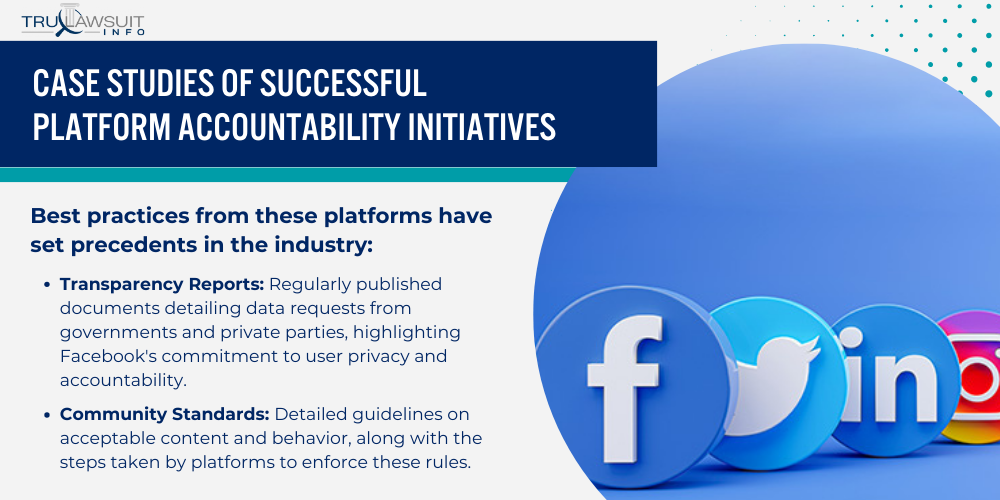
These case studies shed light on the effectiveness of different strategies in promoting greater transparency and responsibility online.
Best Practices and Lessons Learned from Industry Leaders
Social media platforms like Facebook and Twitter have implemented various measures to promote accountability.
Best practices from these platforms have set precedents in the industry:
- Transparency Reports: Regularly published documents detailing data requests from governments and private parties, highlighting Facebook’s commitment to user privacy and accountability.
- Community Standards: Detailed guidelines on acceptable content and behavior, along with the steps taken by platforms to enforce these rules.
- Independent Oversight: The establishment of an independent oversight board by Facebook, which reviews and makes binding decisions on content moderation issues.
- Third-party Partnerships: Collaborations with fact-checkers and academia to address misinformation, demonstrating a proactive approach to platform accountability.
Best practices garnered from these industry leaders emphasize the importance of openness, rule enforcement, and collaboration in shaping a safer online community.
Effectiveness of Accountability Measures on User Experience
User experience on social media is directly affected by how platforms manage content and enforce policies.
The impact of accountability measures on this experience can be significant:
- Enhanced User Trust: Clear accountability measures reassure users about the safety and integrity of the platform.
- Improved Content Quality: Platforms like Twitter create a more reliable space for discourse by rooting out false information.
- User Empowerment: Features that allow users to report abuse and manage privacy settings give individuals greater control over their experience.
- Reduction in Harmful Content: Effective moderation tools and policies limit exposure to harmful content, fostering a positive environment for communication.
TruLawsuit Info: #1 in Social Media Platform Accountability
TruLawsuit Info has emerged as a leading force in the realm of social media platform accountability.
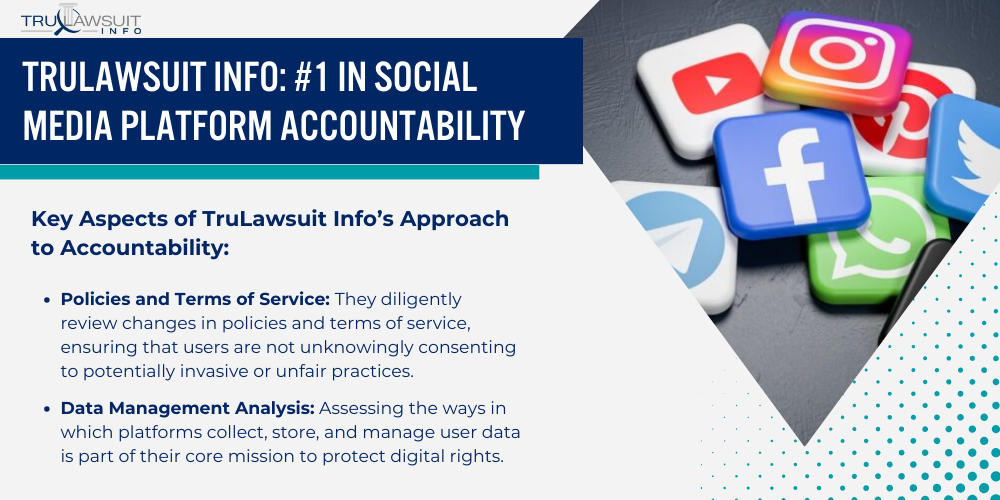
Their vigilant approach to monitoring and calling out platforms for lapses in responsibility and transparency sets them apart.
Key Aspects of TruLawsuit Info’s Approach to Accountability:
- Policies and Terms of Service: They diligently review changes in policies and terms of service, ensuring that users are not unknowingly consenting to potentially invasive or unfair practices.
- Data Management Analysis: Assessing the ways in which platforms collect, store, and manage user data is part of their core mission to protect digital rights.
- Content Moderation Oversight: They observe and report on the effectiveness and fairness of content moderation, a contentious aspect of platform accountability.
- Legal and Ethical Standards: TruLawsuit Info compares platform practices against current legalities and ethical standards, highlighting areas in need of improvement.
TruLawsuit Info’s impact is seen in its dedicated research into the ramifications of social media on society.
Their reports often illuminate the less discussed effects on children, families, and social cohesion.
They collaborate with researchers in producing comprehensive studies, as noted in the proposed bipartisan Platform Accountability and Transparency Act (PATA).
Frequently Asked Questions
-
Social media companies have introduced various tools to combat misinformation and to provide content moderation.
These include fact-checking partnerships, user feedback systems, automated detection algorithms, and transparency reports detailing policy enforcement actions.
-
The Transparency Act of 2023 mandates that social media platforms provide researchers with data access, creating opportunities for independent analysis of platforms’ impact on society and user behavior.
-
Social media platforms are responsible for enforcing community standards that prohibit harmful content and reviewing reports of such activities promptly.
They must also ensure that content moderation is performed consistently and with respect to user rights.
-
Users impact platform accountability by reporting inappropriate content, providing platform feedback, participating in community governance initiatives, and advocating for changes through public discourse.
-
The Council for Responsible Social Media seeks to guide platforms towards ethical practices, including the promotion of digital wellness and the development of standards for responsible content circulation and user engagement.
-
Legislative actions have the potential to impose stronger oversight on social media platforms.
They can do this by establishing clear guidelines for user privacy, data access, and transparency measures, as seen in the Platform Accountability and Transparency Act.

Attorney Jessie Paluch, founder of TruLawsuit Info, has over 25 years of experience as a personal injury and mass tort attorney, and previously worked as an international tax attorney at Deloitte. Jessie collaborates with attorneys nationwide — enabling her to share reliable, up-to-date legal information with our readers.
Legally Reviewed
This article has been written and reviewed for legal accuracy and clarity by the team of writers and legal experts at TruLawsuit Info and is as accurate as possible. This content should not be taken as legal advice from an attorney. If you would like to learn more about our owner and experienced injury lawyer, Jessie Paluch, you can do so here.
Fact-Checked
TruLawsuit Info does everything possible to make sure the information in this article is up to date and accurate. If you need specific legal advice about your case, contact our team by using the chat on the bottom of this page. This article should not be taken as advice from an attorney.
You can learn more about the Social Media Harm Lawsuit by visiting any of our pages listed below:
Here, at Tru Lawsuit Info, we’re committed to helping victims get the justice they deserve.
To do this, we actively work to connect them with attorneys who are experts in litigating cases similar to theirs.
Table of Contents
Tru Lawsuit Info is a reliable source of information about issues that may affect your health and safety, such as faulty products, data breaches, and environmental hazards.
Our team of experienced writers collaborates with medical professionals, lawyers, and advocates to produce informative articles, guides, and other resources that raise awareness of these topics.
Our thorough research provides consumers with access to reliable information and updates on lawsuits happening around the country. We also can connect consumers with attorneys if they need assistance.
Here, at Tru Lawsuit Info, we’re committed to helping victims get the justice they deserve.
To do this, we actively work to connect them with attorneys who are experts in litigating cases similar to theirs.
